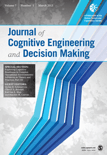
Journal of Cognitive Engineering and Decision Making
Scope & Guideline
Exploring the intersection of mind and machine.
Introduction
Aims and Scopes
- Cognitive Engineering in Automated Systems:
The journal extensively covers the design and evaluation of cognitive systems, particularly how human cognitive processes interact with automated technologies in fields such as transportation, healthcare, and military operations. - Human Factors and Decision-Making:
Research often examines human decision-making under various conditions, including high-stakes environments, highlighting cognitive biases, communication patterns, and the role of trust in automation. - Automation Failures and Human Response:
A consistent theme is the investigation of automation failures, focusing on understanding how humans respond to these failures, the implications for system design, and strategies for mitigating risks. - Interdisciplinary Approaches:
The journal promotes an interdisciplinary perspective, integrating insights from cognitive psychology, human factors, systems engineering, and artificial intelligence to enhance decision-making frameworks. - Training and Skill Development:
Research also delves into training methodologies and tools designed to improve cognitive skills and situation awareness, particularly in high-stress occupations.
Trending and Emerging
- Human-AI Teaming:
There is a growing emphasis on the dynamics of human-AI collaboration, particularly in high-stakes settings like healthcare and military operations, highlighting the need for better integration of AI capabilities with human decision-making. - Automation Failure and Recovery Strategies:
Recent publications increasingly address the nuances of automation failures and the strategies for recovery, focusing on how users can regain situation awareness and effectively manage unexpected system behavior. - Cognitive Biases and Decision-Making in Crisis Situations:
Emerging research is focusing on how cognitive biases affect decision-making during crises, with implications for training and system design to enhance resilience and adaptability. - Ecological Interface Design:
There is significant interest in ecological interface design principles, which aim to create interfaces that align with human cognitive processes, thereby improving usability and reducing errors in complex systems. - Augmented and Virtual Reality Applications:
The use of augmented and virtual reality for training and simulation purposes is gaining traction, particularly in high-risk environments, showcasing innovative approaches to enhance cognitive skills and situational awareness.
Declining or Waning
- Traditional Decision Support Systems (DSS):
There has been a noticeable decrease in articles focused on traditional DSS frameworks, as the field moves towards more integrated and adaptive systems that incorporate real-time data and AI. - Basic Human-Machine Interaction Studies:
Research that merely explores basic human-machine interaction without a focus on cognitive implications or advanced automation appears to be less prominent, as the field increasingly demands nuanced understanding of complex interactions. - Static Models of Trust in Automation:
The exploration of static models of trust, which do not account for dynamic changes in user perceptions or system capabilities, is diminishing as newer, more comprehensive models are developed.
Similar Journals
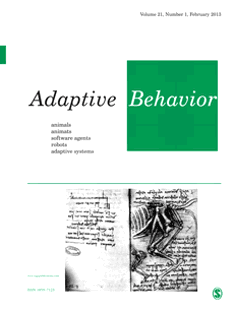
ADAPTIVE BEHAVIOR
Illuminating the Pathways of Adaptive Behavior ResearchADAPTIVE BEHAVIOR is a renowned academic journal published by SAGE PUBLICATIONS LTD, dedicated to advancing the understanding of adaptive mechanisms in behavior across a spectrum of disciplines. With a focus on Artificial Intelligence, Behavioral Neuroscience, and Experimental and Cognitive Psychology, this journal aims to facilitate the dissemination of innovative research and theoretical advancements that relate to adaptive behaviors in both humans and artificial systems. The journal, which spans from 1992 to 2024, holds a commendable position within its field, ranked in the Q3 category for multiple categories, and Q1 in Philosophy. Furthermore, it is recognized within Scopus rankings, ensuring its impact and relevance in the academic community, with a notable rank of #57 in Experimental Psychology and #49 in Behavioral Neuroscience. While ADAPTIVE BEHAVIOR does not currently offer Open Access options, it maintains a vital role in bridging disciplines and fostering discourse among researchers, professionals, and students who are exploring the complexities of behavior in adaptive systems.

Cognitive Research-Principles and Implications
Shaping the Future of Cognitive Neuroscience.Cognitive Research: Principles and Implications, published by SPRINGER, is a premier open-access journal dedicated to the dynamic field of cognitive neuroscience and experimental psychology. Since its inception in 2016, this journal has rapidly established itself as a leading platform for disseminating innovative research, achieving impressive rankings of Q1 in both Cognitive Neuroscience and Experimental and Cognitive Psychology in 2023. With a Scopus ranking of #16 out of 165 in Experimental and Cognitive Psychology and #28 out of 115 in Cognitive Neuroscience, it serves as a vital resource for researchers and practitioners eager to explore the intricacies of cognitive processes. Operating from its base in the United Kingdom, the journal offers open access to its articles, ensuring that groundbreaking research is widely available and can influence both academic inquiry and real-world applications. As the field continues to evolve, Cognitive Research: Principles and Implications remains an essential reference point for advancing understanding in cognitive science, making it an indispensable tool for students, professionals, and academics alike.

JOURNAL OF EXPERIMENTAL PSYCHOLOGY-APPLIED
Illuminating the Path of Human CognitionThe JOURNAL OF EXPERIMENTAL PSYCHOLOGY-APPLIED, published by the American Psychological Association, is a premier outlet for cutting-edge research in the field of Experimental and Cognitive Psychology. With an impressive impact factor indicated by its Q1 ranking in 2023, this journal stands as a leading resource for scholars and practitioners, fostering a deeper understanding of the applications of psychological principles. With its extensive coverage from 1995 to 2024, the journal delivers a wealth of empirical studies, theoretical discussions, and methodological innovations that inform both academic learning and practical implementations in psychology. Although the journal does not offer open access options, researchers can gain insights into its influential findings through libraries or institutional subscriptions. Located in Washington, DC, it serves as a critical platform for disseminating high-quality research that bridges the gap between theory and real-world applications, supporting the advancement of knowledge in the vital area of human cognition and behavior.

Cognitive Processing
Advancing the frontiers of cognitive science.Cognitive Processing, published by SPRINGER HEIDELBERG in Germany, is a leading journal dedicated to advancing the understanding of cognitive processes through interdisciplinary research. With its ISSN 1612-4782 and E-ISSN 1612-4790, the journal covers a diverse range of fields including Artificial Intelligence, Cognitive Neuroscience, and Experimental and Cognitive Psychology, making it an invaluable resource for researchers and professionals alike. While it currently does not operate under an Open Access model, it is well-regarded within the academic community, holding a respectable impact factor and ranking in the Q2 and Q3 quartiles as of 2023. The journal aims to foster innovation and collaboration among scholars, presenting high-quality original research, reviews, and theoretical discussions that bridge the gap between cognitive science and its practical implications. With a convergence of research from 2005 to 2024, Cognitive Processing continues to play a critical role in the evolving landscape of cognitive science literature.

MINDS AND MACHINES
Where Philosophy Meets Artificial IntelligenceMINDS AND MACHINES is a distinguished peer-reviewed journal published by Springer, specializing in the interdisciplinary realms of Artificial Intelligence and Philosophy. Founded in 1991, this journal continues to serve as a critical forum for exploring the intricate relationships between human cognition, artificial systems, and ethical considerations in technology. With an impressive impact factor positioned in the Q1 quartile for both the fields of Artificial Intelligence and Philosophy, MINDS AND MACHINES ranks as a top-tier publication, reflecting its significant contributions to ongoing scholarly discussions. The journal is indexed in Scopus, where it holds the number one rank in Philosophy within the Arts and Humanities category, and the 42nd position in the Computer Science segment for Artificial Intelligence, demonstrating its wide-reaching influence and high citation impact. Although it does not offer open access, its rigorous selection process ensures that only high-quality manuscripts are published, making it an essential read for researchers, professionals, and students aiming to stay at the forefront of developments in these rapidly evolving fields.

Cognitive Computation and Systems
Innovating Cognitive Insights Through Computational Brilliance.Cognitive Computation and Systems is an innovative open-access journal published by Wiley, dedicated to advancing the fields of Artificial Intelligence, Cognitive Neuroscience, and Computer Science Applications. Based in the United Kingdom, this journal has established itself as a key resource for researchers, students, and professionals alike since its inception in 2019. With a focus on the convergence of cognitive theories and computational methodologies, Cognitive Computation and Systems aims to publish high-quality research that bridges holistic cognitive processing with algorithmic design. Although the journal is currently categorized in the lower quartiles of its fields, it provides a unique platform for disseminating pioneering ideas that can drive the vital intersection of computer vision, pattern recognition, and psychology. Scholars can take advantage of its open-access model, ensuring that research findings are freely available, thus promoting wider knowledge sharing and collaboration within these rapidly evolving domains. With its ambitious scope and commitment to quality, this journal is poised to make a significant impact in its respective fields.
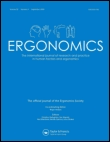
ERGONOMICS
Pioneering insights into ergonomics and human factors.ERGONOMICS is a premier journal that serves the dynamic fields of Human Factors and Ergonomics, as well as Physical Therapy, Sports Therapy, and Rehabilitation. Published by Taylor & Francis Ltd in the United Kingdom, this journal not only boasts a commendable impact factor but also holds a Q2 quartile ranking across its categories, underscoring its influence and academic rigor. With a convergence of significant research dating back to 1957, ERGONOMICS provides a multifaceted platform for the dissemination and discussion of innovative findings that enhance the interaction between people and their environments. Although the journal does not offer Open Access options, it remains a vital resource for researchers, professionals, and students seeking to deepen their understanding of ergonomic principles and applications. Positioned at the intersection of health and human behavior, ERGONOMICS is dedicated to advancing knowledge and promoting best practices in an era where the demand for safe and efficient work environments continues to grow.

PSYCHONOMIC BULLETIN & REVIEW
Exploring the Depths of Cognitive and Experimental Psychology.PSYCHONOMIC BULLETIN & REVIEW is a premier journal published by SPRINGER, dedicated to advancing the fields of psychology, particularly within the domains of Arts and Humanities, Developmental and Educational Psychology, and Experimental and Cognitive Psychology. With its ISSN 1069-9384 and E-ISSN 1531-5320, the journal serves as a vital resource for researchers, professionals, and students striving to stay at the forefront of psychological science. The journal boasts an impressive impact factor and ranks in the top quartile (Q1) in relevant categories, reflecting its prestigious standing in the academic community. Covering research from 1994 to 2024, it offers rich interdisciplinary insights into psychological processes and theoretical developments, supporting researchers in disseminating their findings effectively. While not an open-access journal, it provides various access options to ensure that vital research remains within reach of its audience. With a commitment to fostering scholarly dialogue and innovation, PSYCHONOMIC BULLETIN & REVIEW plays an indispensable role in shaping contemporary psychological discourse.
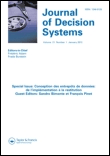
Journal of Decision Systems
Connecting Theory with Practice in Decision SciencesThe Journal of Decision Systems, published by Taylor & Francis Ltd, is a premier scholarly platform dedicated to advancing the fields of Library and Information Sciences, Management Information Systems, and Software. Since its inception in 1992, this journal has distinguished itself with a strong standing in the academic community, achieving a Q1 ranking in Library and Information Sciences and Q2 rankings in both Management Information Systems and Software as of 2023. With an impressive Scopus rank of #40 out of 280 in its primary discipline, the journal is situated in the top 85th percentile, making it a critical resource for researchers, professionals, and students striving to deepen their understanding of decision-making systems. Although not an open-access journal, it provides an essential repository of cutting-edge research and insights, serving as a valuable reference point for the ongoing discourse in decision systems. With a commitment to rigorous scholarship and a focus on current trends and challenges in this dynamic field, The Journal of Decision Systems plays a vital role in shaping knowledge and practice.
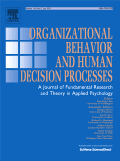
ORGANIZATIONAL BEHAVIOR AND HUMAN DECISION PROCESSES
Navigating the intersection of psychology and organizational dynamics.ORGANIZATIONAL BEHAVIOR AND HUMAN DECISION PROCESSES is a premier academic journal published by Academic Press Inc Elsevier Science, focused on the interplay between individual behaviors and organizational dynamics. Established in 1985, this journal stands out with its high impact, reflected in its Q1 ranking within both the Applied Psychology and Organizational Behavior and Human Resource Management categories for 2023. Boasting a strong reputation, it ranks #29 out of 249 in Applied Psychology and #27 out of 230 in Organizational Behavior, positioning it in the top 12% of its field. The journal aims to advance the understanding of human decision-making processes in organizational contexts, presenting cutting-edge research that contributes to both theoretical frameworks and practical applications. Though currently not an open-access publication, its rigorous peer-review process ensures that only the most relevant and impactful studies are disseminated to aid researchers, professionals, and students alike in navigating the complexities of human behavior in organizational settings. In a rapidly evolving organizational landscape, this journal remains a vital resource for those aiming to enhance their knowledge and application of behavioral science.